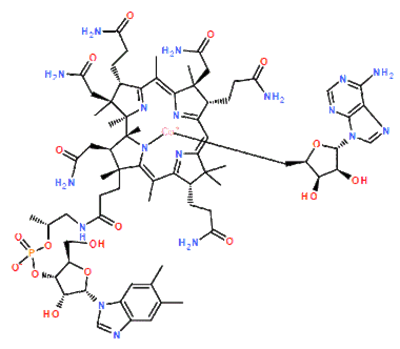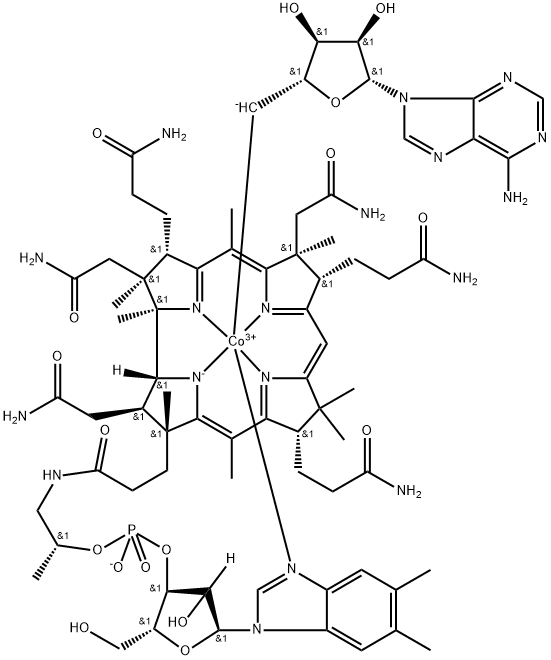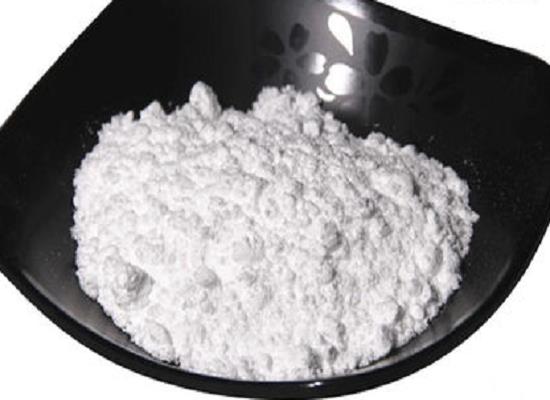Coenzyme B12 vs Vitamin B12
Coenzyme B12
Coenzyme B12 is a red crystalline compound, and the metalloenzyme structure of cobalamin is a cobalt ring, with cobalt being the only metal in the molecule located in the centre of the structure through four nitrogen ligand bonds of four pyrrole groups. These four substituents are evenly distributed in the same plane, directly opposite each other. They are also connected to each other by a C-CH3 methylidene linkage on one of the other sides, a C-H linkage on one side, and two pyrroles directly attached to each other. Since cobalt is the central metal of the molecule, cobalamin is in a distorted octahedral configuration. The structure is shown below:

Coenzyme B12 serves as a cofactor in various enzymatic reactions in which a hydrogen atom is interchanged with a substituent on an adjacent carbon atom. Measurement of the dissociation energy of the coenzyme''s cobalt-carbon bond and studies of the rearrangement of model free radicals related to those derived from methylmalonyl-coenzyme A suggest that these enzymatic reactions occur through homolytic dissociation of the coenzyme''s cobalt-carbon bond, abstraction of a hydrogen atom from the substrate by the coenzyme-derived 5′-deoxyadenosyl radical, and rearrangement of the resulting substrate radical. The only role thus far identified for coenzyme B12 in these reactions—namely, that of a free radical precursor—reflects the weakness, and facile dissociation, of the cobalt-carbon bond.
Vitamin B12
Vitamin B12, the "antipernicious anaemia factor", is a crystallisable cobalt-complex, which belongs to a group of unique "complete" corrinoids, named cobalamins (Cbl). In humans, instead of the "vitamin", two organometallic B12-forms are coenzymes in two metabolically important enzymes: Methyl-cobalamin, the cofactor of methionine synthase, and coenzyme B12 (adenosyl-cobalamin), the cofactor of methylmalonyl-CoA mutase. The cytoplasmatic methionine synthase catalyzes the transfer of a methyl group from N-methyl-tetrahydrofolate to homocysteine to yield methionine and to liberate tetrahydrofolate. In the mitochondrial methylmalonyl-CoA mutase a radical process transforms methylmalonyl-CoA (a remains e.g. from uneven numbered fatty acids) into succinyl-CoA, for further metabolic use. In addition, in the human mitochondria an adenosyl-transferase incorporates the organometallic group of coenzyme B12. In all these enzymes, the bound B12-derivatives engage (or are formed) in exceptional organometallic enzymatic reactions.
Cobalamin has many beneficial effects in regard to biological existences. They play a role to maintain healthy body system and help to aid the production of the body’s genetic materials. Cyanocobalamin, one type of cobalamin, works to generate the forming of red blood cells and heal many different damages in the nervous system. Cobalamin also serves as a vital role in the metabolism of fatty acids essential for the maintainence of myelin. Studies have shown that people with Vitamin B12 deficiency will reveal irregular destruction of the myeline shealth, which leads to parlysis and death. Some of the other symptoms of the lack of cobalamin are poor growth, megaloblastic bone marrow, Gi tract changes, Leucoopenia and hyper-segmented nutrophills, degenerative changes in spinal cord and nervous system and excretion of methyl malonic acid and homocystin in urine.
Studies have shown that vitamin B12 is essential for the functioning of the nervous system and the production of red blood cells. One study suggests that vitamin B12 deficiency may increase the risk of neural tube defects in children (Miller). Therefore, by studying the structure and function of cobalamin, scientists can experiment and form vitamin B12 in their labs.
References:
[1] HALPERN J. Mechanisms of Coenzyme B12-Dependent Rearrangements[J]. Science, 1985. DOI:10.1126/science.2857503.
Lastest Price from Coenzyme B12 manufacturers

US $0.00/g2025-04-21
- CAS:
- 13870-90-1
- Min. Order:
- 50g
- Purity:
- 99%
- Supply Ability:
- 10kg/month

US $10.00/KG2025-04-21
- CAS:
- 13870-90-1
- Min. Order:
- 100KG
- Purity:
- 99%
- Supply Ability:
- 100 mt


